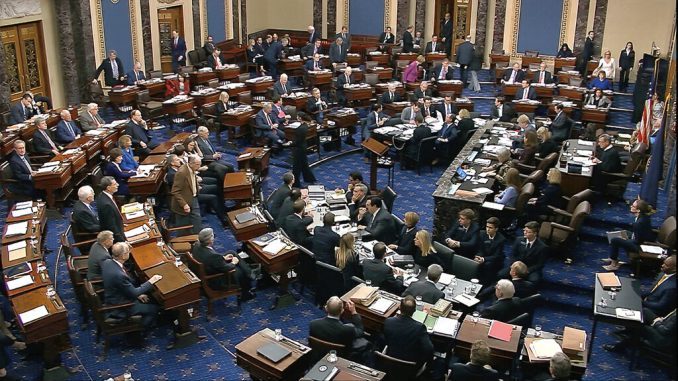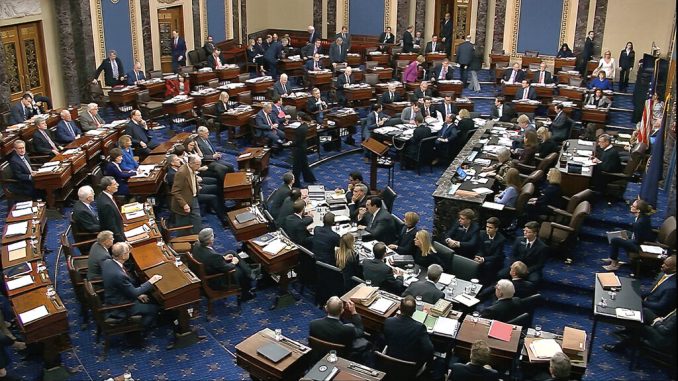

WASHINGTON, D.C. — The Senate voted against summoning witnesses for President Donald Trump’s impeachment trial late Friday. But senators considered pushing off final voting on the impeachment verdict to next week.
The vote on allowing new witnesses was defeated 51-49 on a near party-line vote.
Republicans Susan Collins of Maine and Mitt Romney of Utah voted along with the Democrats for witnesses.
Despite the Democrats singular focus on hearing new testimony, the Republican majority held to move the impeachment trial towards and ending. Leaks from the media related to former national security adviser John Bolton did not sway GOP senators, who said they’d heard enough.
The impeachment of the president now lands squarely in an election year before a divided nation. Caucus voting begins Monday in Iowa, and Trump gives his State of the Union address the next night.
Trump was impeached by the House last month on charges the he abused power and obstructed Congress. The House impeachment resolution alleged that Trump tried to pressure Ukraine to investigate Democratic rival Joe Biden, and then blocked the congressional probe of his actions by seeking judicial review of subpoenas.
The Democrats had badly wanted testimony from John Bolton, Trump’s former national security adviser. But Bolton won’t be summoned, and none of this appeared to affect the trial’s expected outcome.
Key Republican senators said even if Trump committed the offenses as charged by the House, they are not impeachable and the partisan proceedings must end.
“I didn’t need any more evidence because I thought it was proved that the president did what he was charged with doing,” retiring GOP Sen. Lamar Alexander of Tennessee, a key hold out, told reporters Friday at the Capitol. “But that didn’t rise to the level of an impeachable offense.”

Republican Sen. Lisa Murkowski of Alaska said she, too, would oppose more testimony in the charged partisan atmosphere, having “come to the conclusion that there will be no fair trial in the Senate.” She said, “The Congress has failed.”
Eager for a conclusion, Trump’s allies nevertheless suggested the shift in timing to extend the proceedings into next week and it shows the significance of the moment for senators in casting votes in only the third presidential impeachment trial in American history.
The situation remained fluid, but senators have indicated they want more time to publicly debate the charges and air their positions on the coming vote, according to a Republican familiar with the proposal but unauthorized to discuss it. The person was granted anonymity.
Senate Majority Leader Mitch McConnell made the offer to Democratic Leader Chuck Schumer, the person said. Senators were considering it while the proceedings were underway on the Senate floor. Schumer had not yet agreed to it.
Under the proposal, the Senate would resume Monday for final arguments, with time Monday and Tuesday for senators to speak. The final voting would be Wednesday.
To bring the trial toward a conclusion, Trump’s attorneys argued the House had already heard from 17 witnesses and presented its 28,578-page report to the Senate. They warned against prolonging it even further after House impeached Trump largely along party lines after less than thee months of formal proceedings making it the quickest, most partisan presidential impeachment in U.S. history.
Trump is almost assured of eventual acquittal with the Senate nowhere near the 67 votes needed for conviction and removal.
To hear more witnesses, it would have taken four Republicans to break with the 53-seat majority and join with all Democrats in demanding more testimony. But that effort fell short.
Chief Justice John Roberts, in the rare role presiding over the impeachment trial, has a legally debatable ability to break a tie, but that seems unlikely.
Murkowski noted in announcing her decision that she did not want to drag the chief justice into the partisan fray.
Protesters stood outside the Capitol as senators arrived on Friday, but few visitors have been watching from the Senate galleries.



